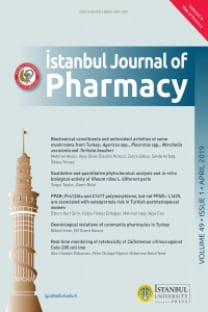Assessment of knowledge and attitude of undergraduate students’ of Ahmadu Bello University Zaria towards depression
Depression Knowledge, Attitude, Undergraduate-students, Nigeria,
___
- Adeosun, I. I. (2016). Adolescent students’ knowledge of depres- sion and appropriate help-seeking in Nigeria. International Neu- ropsychiatric Disease Journal, 6(3), 1-6. https://doi.org/10.9734/ indj/2016/24002
- Aluh, D.O., Anyachebelu, O.C., Anosike, C., & Anizoba, E.L. (2018). Mental health literacy: what do Nigerian adolescents know about depression? International Journal of Mental Health Systems, 12(8). https://doi.org/10.1186/s13033-018-0186-2
- Amarasuriya, S. D., Jorm, A.F., & Reavley, N. J. (2015). Depression literacy of undergraduates in a non-western developing con- text: the case of Sri Lanka. BMC Research Notes, 8, 593 https://doi. org/10.1186/s13104-015-1589-7 PMC4619076
- Burns, J.R. & Rapee, R.M. (2006). Adolescent mental health literacy: Young people’s knowledge of depression and help seeking. Jour- nal of Adolescence, 29(2), 225-239. https://doi:10.1016/j.adoles- cence.2005.05.004
- Dawood, E., Mitsu, R., Ghadeer, H.A., & Alrabodh, F. (2017). Assess- ment of depression and its contributing factors among under- graduate nursing students. International Journal of Nursing, 4(2), 69-79 https://doi.org/10.15640/ijnv4n2a6
- Egwuonwu, C.C., Kanma-okafor, O. J., Ogunyemi, A. O., Yusuf, H. O., & Adeyemi, J. D. (2019). Help-seeking behavior among residents of Surulere local government area, Lagos State, Nigeria. Journal of Clinical Sciences, 16(2), 49–56. https://doi.org/10.4103/jcls.jcls
- Gureje, O., Lasebikan, O., Ephraim-Oluwanuga, O., Olley, B.O., & Kola, L. (2005). Community study of knowledge and attitude to mental illness in Nigeria. British Journal of Psychiatry, 186, 436–441. https://doi.org/10.1192/bjp.186.5.436; https://doi. org/10.1371/journal.pone.0153454; https://doi.org/10.2174/157 0159x1304150831150507
- January, J., Madhombiro, M., Chipamaunga, S., Sunanda, R., Alfred, C., & Melanie, A. (2018). Prevalence of depression and anxiety among undergraduate university students in low- and middle- income countries: A systematic review protocol. Systematic Re- view, 7, 57 https://doi.org/10.1186/s13643-018-0723-8
- Kutcher, S., Gilberd, H., Morgan, C., Greene, R., Hamwaka, K., & Perkins, K. (2015) Improving Malawian teachers’ mental health knowledge and attitudes: An integrated school mental health literacy approach. Global Mental Health (Cambridge).16(2)e1. https://doi.org/10.1017/gmh.2014.8
- Lei, X., Xiao, L., Liu. Y., & Li, Y. (2016). Prevalence of depression among Chinese university students: A meta-analysis. Plos One, 11(4) e0153454
- Marcus, M., Taghi, Y., Mark-van, O., Dan, C., & Shekhar, S. (2012). Depression a global public health concern. Retrieved from https:// www.who.int/mental_health/management/depression/who_ paper depression_wfmh_2012.pdf Accessed 18/02/2020
- McLaughli, K.A. (2011). The public health impact of major depres- sion: A call for interdisciplinary prevention efforts. Preventive Sci- ence, 12(4), 361–371. https://doi.org/10.1007/s11121-011-0231-8
- Mirón, J., Goldberg, X., López-Sola, C., Nadal, R., & Armario, A. (2019). Perceived stress, anxiety and depression among under- graduate students: An online survey study. Journal of Depression and Anxiety, 8, 330 https://doi:10.4172/2167-1044.100033
- Reddy, M. S. (2010). Depression: The disorder and the burden. Indian Journal of Psychological Medicine, 32(1), 1 –2. https:// doi:10.4103/0253-7176.70510
- Suicide Fact Sheets (2019). WHO. Retrieved from https://www. who.int/news-room/fact-sheets/detail/suicide
- Tamez, J., Du, Y., & Shah, A. (2016). Management of treatment- resistant depression in intensive outpatient programs. Psychia- try Annals, 46(4), 236-239. https://doi.org/10.3928/00485713- 20160218-01
- Yang, L., Zhao, Y., Wang, Y., Liu, L., Zhang, X., Li, B., & Cui, R. (2015). The effects of psychological stress on depression. Current Neuro- pharmacology, 13(4), 494-504.
- ISSN: 2548-0731
- Yayın Aralığı: Yılda 3 Sayı
- Başlangıç: 1965
- Yayıncı: İstanbul Üniversitesi
Justina BENSON OGALA, Yusuf HASSAN, Abdullahi SAMAILA, Murtala ISAH BİNDAWA, Tugba TASKIN TOK
Hazal EKEN, Nurcan BEKTAŞ TÜRKMEN, Rana ARSLAN
Nur Banu BAL, Sevtap HAN, Suzan USANMAZ, Orhan ULUDAĞ, Emine DEMİREL YILMAZ
Sadi KIZILŞAHİN, Çinel KÖKSAL KARAYILDIRIM, Buket BAKAN, Ayşe NALBANTSOY, Ülkü KARABAY
Berna TERZİOĞLU BEBİTOĞLU, Seyhan HIDIROĞLU, Reyhan AYAZ, Alican SARISALTIK, Derya KOÇ
Ezgi ERSOY, Selim KARAHAN, Mehmet BOĞA, Ercan ÇINAR, Sevcan İZGİ, Emel MATARACI KARA, Yeter YEŞİL, Esra EROĞLU ÖZKAN
Müjgan ÖZFENERCİ, Elif Burcu BALİ, Demet ERDÖNMEZ, Ufuk KOCA ÇALIŞKAN
Fatima Idris AUWAL, Maryam Yusuf TANİMU, Samira Nndawan ABDU-AGUYE, Hadiza Usman MA'AJİ
Tugce BORAN, Bahar ULUS KARACA, Ayça KARAGÖZ KÖROĞLU, Engin KAPTAN, Feriha ERCAN, Gül ÖZHAN
